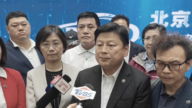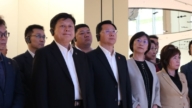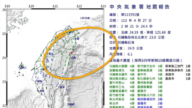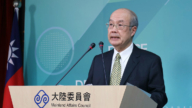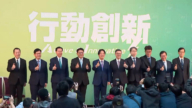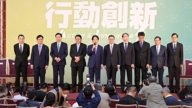【新唐人2014年06月14日訊】6月11號,中共國臺辦就台灣臺南市長賴清德訪問上海時的談話做出回應,表示:台灣前途「由全中國人民共同決定」,這是繼10號中共發表香港《白皮書》之後,又一次引發了外界強烈的反彈。評論人士指出,中共內憂外患、四面楚歌,該是人民自己決定未來前途的時機了。
上週末,台灣臺南市長賴清德在上海訪問時提到,台灣前途由2300萬人民共同決定。國臺辦針對賴清德的談話回應說,「兩岸不是國與國關係,任何涉及中國主權和領土完整的問題,必須由包括台灣同胞在內的全中國人民共同決定。」而引發台灣朝野及各界反彈。
台灣的「中華民國」總統府回應,總統馬英九態度始終一致,就是:中華民國是一個主權獨立的國家,台灣前途應該由全臺2,300萬人,依據「中華民國憲法」來決定。
台灣陸委會也聲明:台灣的未來及兩岸關係的發展由台灣人民共同決定,這是台灣社會的共識……等。
台灣行政院強調:未來仍將在「互不承認主權、互不否認治權」的前提下,推動兩岸制度化協商和各項交流。
而台灣在野黨「民進黨」立委蔡其昌,11號下午在大陸微博上留言說:「我們也希望有一天,全中國人民都能用手中的選票決定自己的前途!」
網上台灣網友表示,中國共產黨的命運,敢不敢交給全中國人民公投決定呢?
台灣前總統府人權委員會委員楊憲宏:「當然不敢了﹗賴清德市長他說了,台灣的前途由台灣2300萬人決定,中共很敏感,說香港『佔中』很可能會高喊說,香港前途由香港700萬居民來決定,那你中國13億人民可不可自己先決定中國自己的前途啊﹖它們(中共)怕這個影響。」
台灣前總統府人權委員會委員、政治評論人士楊憲宏表示,中共國臺辦講出這個話之後卻沒有想到,那無意中觸及了一個最敏感的話題,就是:人民到底能不能決定自己的前途?這無形中也打破了一個叫人民自己決定自己的禁忌。
台灣智庫諮詢委員、「警察大學公共安全系」副教授董立文表示,台灣2300萬人決定未來,是有「公投法」做保障的。而在中國,中國人民實際上是被中共排除的。
台灣警大公共安全系副教授董立文:「但我們都知道,所謂的全中國人民決定,在中國大陸根本沒有全中國人民決定任何事情的程序跟法律,所以講到最後,就是中共它們決定了。」
董立文還表示,中共國臺辦的這個回應,同時也是針對香港《白皮書》引起反彈後的解釋。
6月10號,中共國務院突然發表措詞強硬的《白皮書》,聲稱中共對香港有全面管治權。
董立文表示,「香港白皮書」違反了中國的憲法,也破壞了「香港基本法」,是一個「混憲亂法」的文件。
董立文:「這個文件有很大的部分是在從新解釋、從新定義香港基本法是甚麼,它裡面有充滿了很多法律上的敘述,講一個政府的基本的它的權利跟義務的時候,這就是憲法了,如果按照中華人民共和國的憲法,那香港基本法的解釋權也應該是全國人大常委會,怎麼會是國務院呢?」
董立文認為,中共這樣做的目地,就是在告訴香港人民,所有香港的權力都是中央給的,這也就是《白皮書》的基本作用。
自從進入2014年以來,中共面臨了國內經濟下滑,新疆、西藏問題凸顯、環境污染嚴重、腐敗盛行、官民矛盾日益尖銳;另外,香港佔領中環、台灣「太陽花學運」;再加上國際上的東南海紛爭、與美國的網絡戰爭等問題,中共可謂是四面楚歌。
董立文:「它現在是內憂外患不斷,整個政治經濟跟社會的發展,已經到了一個瓶頸,(如果)維持它的一黨專制,壓制人民的權利跟主張,我覺得這個體制它會撐不下去的。」
楊憲宏表示,中共跟蘇聯和東歐國家一樣,隨時都有可能在一夜之間倒臺。他希望民主國家能做好迎接中共崩潰後的準備。
採訪編輯/易如 後製/舒燦
Taiwanese Question Whether The CCP Dares Allow 1.3 Billion To Vote
The Taiwan Affairs Office of the State Council of the Chinese
Communist Party (CCP) responded to Tainan City Mayor
William Lai’s speech during his visit to Shanghai by saying
Taiwan’s future fate “is determined by all Chinese people."
This sparked another round of public backlash following
the June 10 publishment of the white paper on Hong Kong.
Commentators point out that the CCP is facing serious
domestic and international troubles;
It is time for Chinese people to decide
the fate of their future.
During his visit to Shanghai last week, Tainan Mayor William
Lai said Taiwan’s future is decided by its 23 million people.
In response, the CCP’s Taiwan Affairs Office
issued a statement.
It read, “The cross-straight relationship
is not between countries.
Any issue relevant to China’s sovereignty and territory must
be determined by all Chinese people, including Taiwanese."
This triggered strong backlash from Taiwan’s
political sphere and the public.
The Office of the President, Republic of China responded
by stating President Ma Ying-jeou has always held
a consistent stance regarding this matter.
That is, the Republic of China is an independent sovereignty
and Taiwan’s future should be determined
by the 23 million Taiwanese people according
to the Republic of China’s Constitution.
Taiwan’s Mainland Affairs Council also stated
that Taiwan’s future and the bilateral cross Strait relationship
are determined by Taiwan’s people, which is a consensus
of Taiwanese society.
The Executive Yuan of Taiwan emphasized that in the future
under the precondition, “Both of sides neither recognize
mutual sovereignty nor deny mutual governance,” Taiwan
will promote institutional negotiation and exchanges.
Mr. Tsai Chi-chang is a Democratic Progressive Party member
and a representative of the Legislative Yuan of Taiwan.
On the afternoon of June 11, his Weibo post to Mainland
read, “We hope that one day all Chinese people can
determine their own future with their votes"
Taiwanese netizens question whether the CCP dares to place
its fate in the hands of Chinese people』s popular vote.
Yang Sen-Hon, former member, Presidential Human Rights
Advisory Committee, Taiwan: “Of course (they) don’t dare!
Mayor William Lai said Taiwan’s future is determined
by Taiwan’s 23 million people.
The CCP is very sensitive to these words.
They think, ‘Hong Kong’s Occupy Central activists may shout,
“Hong Kong’s future is decided by 7 million Hong Kongers."
Then, can 1.3 billion Mainland Chinese people
determine their own future?’
They (the CCP) fear such an impact."
Mr. Yang Sen-Ho analyzes that when the CCP’s Taiwan Affairs
Office issued that statement, they did not expect
it to spark a most sensitive topic—
Can humans determine their own future?
The statement unintentionally breaks the taboo
of allowing people to determine their own future.
Dr. Li-Wen Tung is a consulting member of Taiwan Thinktank
and associate professor of the Public Security Department
at the Central Police University.
He says 23 million Taiwanese determining their future
is secured by the referendum law.
However, in Mainland China, the CCP excludes
Chinese people from having a say.
Associate Professor Li-Wen Tung: “As we all know, (issues
regarding) the so-called, ‘all Chinese people decide’ are
determined by the CCP, as there is absolutely no procedure
and law allowing Chinese people to determine anything."
Li-Wen Tung also expressed that the response issued
by the CCP’s Taiwan Affairs Office is aimed
at the outraged public who are fired up over
the white paper on Hong Kong.
On June 10, the CCP State Council abruptly published
a strongly worded white paper on Hong Kong.
The document claims the CCP has full governmental control
over Hong Kong.
Li-Wen Tung says the white paper on Hong Kong
violates Mainland China’s Constitution.
It also undermines the Basic Law of Hong Kong
by chaotically confusing constitutions.
Li-Wen Tung: “That document largely re-interprets
and re-defines what the Basic Law of Hong Kong is.
There are many legal statements in the document.
When a document states the basic responsibility
and rights of a government, it is a constitution.
According to the Constitution of Mainland China,
the interpretation rights should be owned by the Standing
Commission of the National People’s Congress.
How could State Council say it in this way?"
Li-Wen Tung confirms the CCP’s purpose is to tell Hong Kong
people that all rights are bestowed by the CCP Central.
This is the basic purpose of the white paper on Hong Kong.
Since 2014, the CCP has faced a series of severe problems —
an economic downturn, conflicts in Xinjiang and Tibet,
environmental pollution, rife corruption and increasing
acute conflicts between the populace and the government.
In addition, the peaceful end of Hong Kong’s Occupy Central
and Taiwan’s Sunflower Student Movement,
the conflicts on the East and South Sea
with neighboring countries,
and the Internet war with the U.S. have all seriously
impacted the CCP and besiege the CCP on all sides.
Li-Wen Tung: “The CCP is entrenched in problems at home
and abroad.
Political, economic and societal development
has bottlenecked.
(If) they maintain a one-party dictatorship and suppress
people’s rights, I don’t think the regime can survive."
Yang Sen-Ho believes the CCP could collapse overnight just
like the former USSR and many Eastern European countries.
He hopes democratic countries make preparations
for the CCP’s collapse.
Interview、Edit/Yi Ru Post-Production/Shu Can





